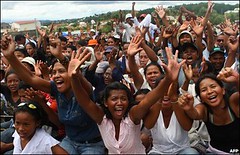
Madagascar supporters of President Marc Ravalomanana who was overthrown by the opposition and the military. The African Union has condemned the actions of the opposition and the military as a "coup."
Originally uploaded by Pan-African News Wire File Photos
By Alain Iloniaina
Cape Times
ANTANANARIVO--Thousands of opponents of Madagascar's new president, Andry Rajoelina, have rallied for the first of what they say will be daily protests against his army-backed takeover on the Indian Ocean island.
Unrest before Rajoelina's rise to power left 135 people dead, crippled the R3.9-billion tourism industry and unnerved foreign investors in the important mine and oil sectors.
Witnesses said about 3 000 supporters of Marc Ravalomanana, who stepped down last week, ending seven years as president, gathered in a park here for several hours yesterday morning, chanting slogans and pledging resistance.
"I am here to show my refusal to accept the transitional government," said school teacher Olga, who declined to give her surname.
"Ravalomanana had two more years left. Why didn't they wait for elections and listen to the Malagasy people?'
The demonstrators had planned to march to the May 13 square, where Rajoelina held months of near-daily protests that pressured Ravalomanana into standing down.
They dispersed, however, when an army vehicle pulled up and a shot was fired, apparently in warning, into the air.
"We have not finished yet," the crowd chanted in Malagasy, pledging to protest every day.
Rajoelina, who at 34 is Africa's youngest president and who galvanised the backing of opposition parties to oust Ravalomanana, does appear to have strong support among the young and poor in the capital. He also has the military top brass behind him.
But analysts say he remains vulnerable to divisions in the army and population.
"Ravalomanana's support goes fairly deep and there will be a feeling that Rajoelina is weak, so there will be pressure on him to act," said Stephen Ellis, African studies professor at the Free University of Amsterdam, in the Netherlands.
Ravalomanana's supporters have been buoyed by condemnation by the EU and other foreign powers that consider Rajoelina's rise to be a coup.
Washington and Norway have withdrawn their aid, while the African Union has suspended Madagascar in protest at what it, too, sees as a coup.
"We cannot accept the seizure of power by arms and force," a spokesman for Ravalomanana's party, Raharinaivo Andrianantoandro, told the protesters.
"We want a return to legal order and the re-establishment of institutions."
Andrianantoandro called for independent political reconciliation talks.
Rajoelina, a businessman and former disc jockey with little political experience beyond nearly two years as mayor of the capital, held a cabinet meeting yesterday, while civil servants milled outside, hoping to return to their desks.
"It will be good to be able to go back to work. It has been hard for us," said one woman who was a cook at the building where the president and ministers were meeting.
Having presented itself as a pro-democracy, reformist movement fighting an old-fashioned dictator, Rajoelina's camp has been stung by the international disapproval.
Under Madagascar's constitution, Rajoelina is six years too young to be president.
He says he is president of a transitional authority, not the republic, and has pledged to call elections within two years. Foreign countries, including former colonial power France, say they should be held sooner.
The whereabouts of Ravalomanana, 59, remain unknown.
Multinationals in Madagascar's fast-developing minerals and hydrocarbon industries are waiting to learn their fate as Rajoelina has said deals deemed not in the public interest may be renegotiated.
He has pledged to maintain his predecessor's free-market economic policies, while stamping out waste and corruption and tackling poverty.
Published on the web by Cape Times on March 24, 2009.
No comments:
Post a Comment